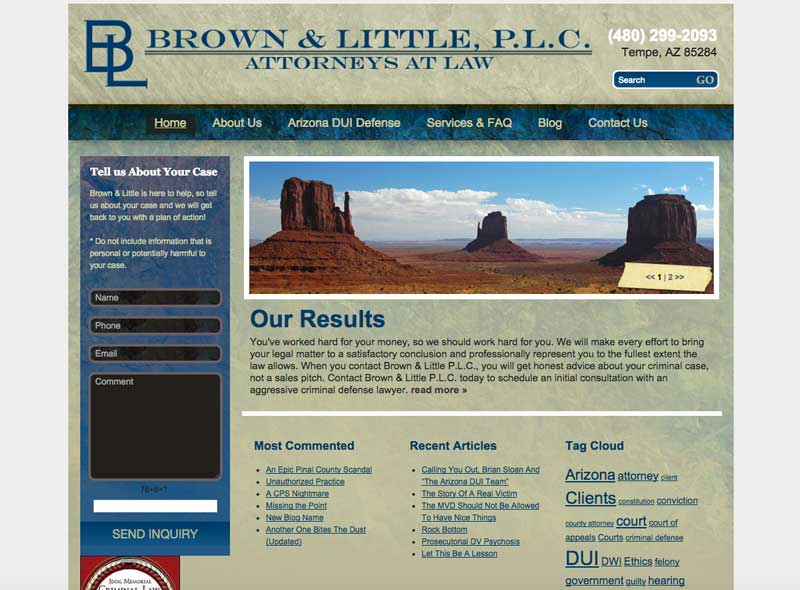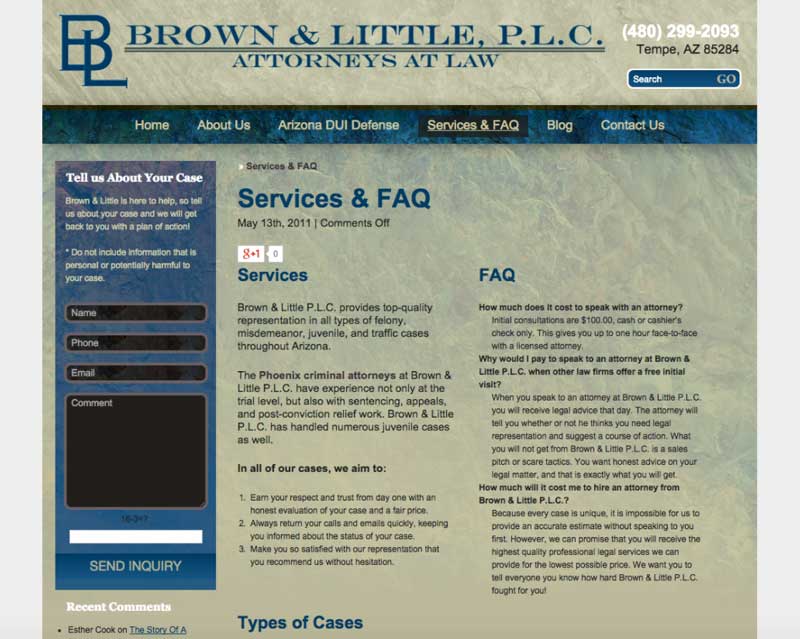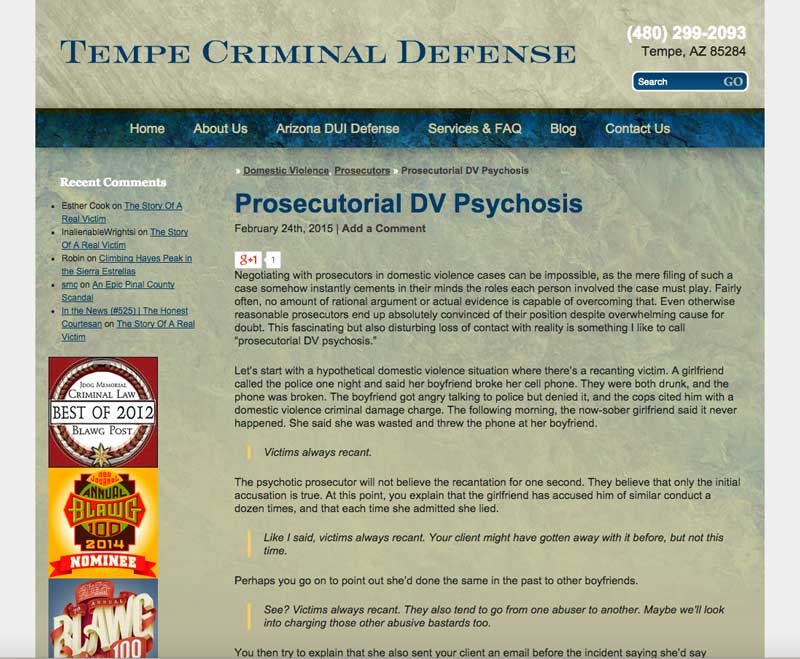This criminal defense lawyer generates referrals from other attorneys with his blog and weeds out those unable to pay with a consultation fee.
Starting a solo law practice was not a fallback plan for Matt Brown. He aimed from the outset to launch his own criminal defense practice. “I spent more time in law school preparing to open up the firm that I did really taking law school seriously,” he says, half seriously. Brown evidently prepared himself well for the challenge. Eight years after getting his J.D. and hanging his shingle, he is still in business in a highly competitive niche, specializing in DUI defense in a big college and sports town. His firm, Brown & Little PLC, now has two attorneys.
Brown has an award-winning blog, called simply Tempe Criminal Defense, which has helped him make a name for himself. He thinks more attorneys should publish thought-provoking blogs. But that is not at the top of the list of keys to his success. His best advice to anyone starting a private criminal defense practice is to gravitate as quickly as possible towards a client base that can afford to pay attorney’s fees. A good first step in that direction, he says, is to stop giving initial consultations at no charge.

Move Away from Court-Appointed Cases ASAP
Like most criminal defense attorneys just starting out in a private practice, Brown initially took court-appointed cases. It was a good learning experience, but not a good way to build a practice. “One of my big mistakes was to hold on to indigent defense contracts after they were no longer useful. I highly recommend them to get experience, but once we gained the experience, they no longer had any value,” says Brown, who adds, “I would dissuade anyone in criminal defense from doing these indigent defense contracts for a second longer than they have to. They never really lead to real referrals.”
For much the same reason, Brown also began charging $100 for initial meetings with prospective clients. Why anyone should pay for an initial visit with an attorney at Brown & Little when other lawyers offer free consultations visits is apparently the most frequently asked question the firm gets. The firm web site’s FAQ section is devoted to explaining the policy, which is portrayed as a selling point. Implying that you’ll get what you pay for in your first visit at those other firms — which is to say, not much — the answers explain that at Brown & Little, you’ll get “up to one hour face-to-face with a licensed attorney” who will “tell you whether or not he thinks you need legal representation and suggest a course of action. What you will not get … is a sales pitch or scare tactics.”

Brown isn’t dead-set against free consultations. “There have been periods when we have tried that,” he says. “But a lawyer who was a mentor to me when I was just starting out said he always charged $100. His rationale was, if they can’t afford $100 for a consultation, they probably can’t afford my fee.” Brown adds, “I never noticed an uptick in calls when we offered free consultations. What I noticed was an uptick in the number of people who didn’t show up.”
Brown has found that giving clients who paid out of pocket for his services their money’s worth is the best marketing strategy. They are the ones who send him most of his new business. “The vast majority of our clientele comes from word-of-mouth,” he explains. “I would be astonished if word of mouth didn’t account for at least three quarters of every bit of income that comes through the door.”

Blogging Begets Referrals
Referrals from other attorneys account for another sizable chunk of his caseload, says Brown. His blog, which has been named to the ABA Journal’s list of top 100 law blogs twice in the past four years, has helped him make connections with the colleagues who have sent business his way.
“I would suggest that more attorneys blog,” says Brown. At least in his case, it has not proven to be a way to directly reach potential clients. “Every once in a great while, I get someone who says they have read my blog, so I can’t say that it has really done much for name recognition among our clients.” But his blog has been very effective in making a name for himself with other lawyers, who are his blog’s target audience.
“It certainly has let prosecutors know who I am,” says Brown. “A lot of them get upset about it because I am sometimes confrontational about inequities in the system.” Other defense attorneys are also occasionally skewered in his blog posts, particularly if they have resorted to questionable marketing practices. But his feisty attitude is appreciated by most of his colleagues in the defense bar, and it helps assure that they think of him when they have a case they can’t handle themselves. He, in turn, regularly refers cases to other attorneys he has met in the blogosphere. “And normally, they’re good cases, because they are people whose opinions I respect, and I would not want to send them a bad client,” he says.
“Blogging can be an amazing source of referrals from other attorneys,” Brown adds. “I wish I had started the blog the day I opened the practice. I think I would have built even more relationships and the firm would have been successful faster if I had done that.”

Opinionated Posts Have Biggest Impact
To gain an audience, a law blog “really has to have something to say, and it has to be interesting, well-written and well-reasoned,” says Brown. Most law blogs he peruses don’t past that test, in his opinion. “Most of the posts are like ‘top 10 reasons you need a divorce attorney,’ or ‘how DUI penalties have changed.’ They are not saying anything that anyone interested in the law would ever bother reading.”
His blog has gained national recognition because it isn’t filled with “marketing crap,” he says. “Before I hit publish, I ask myself, is there somebody who is going to read this and learn something or print it out and give it to someone?” If so, he will post it, without any thought as to whether it will be widely read or not.
Brown is disdainful of attorneys who let marketing experts write their blog posts and web site content. That trend is a major reason why there is what he calls a “huge mess of misinformation on lawyers’ websites.” He discussed that phenomenon in a post about the dearth of accurate information on firearm possession on attorney websites in Arizona. “I could not find a lawyer website that accurately stated the law, and I guarantee those lawyers are smart enough to know what the law says,” Brown asserts. “But you can’t make it onto the first page of Google search results without the right keywords, and apparently the keywords that get you onto the first page are not the words that accurately describe what the crime actually is. I think that’s a huge disaster,” he says. “If you are going to trust a website, I would think you should be able to trust a lawyer’s website, with all the ethics rules and everything. But you can’t.”
Brown is not averse to letting internet experts maintain his blog as long as they don’t tinker with the content for the sake of search engine optimization. “Even if you have an SEO guy you trust handling your web site, you should still look at it pretty frequently to make sure he hasn’t moved things around,” Brown says. “You should hire a professional and then make sure that the professional isn’t doing anything that they shouldn’t be doing.”




